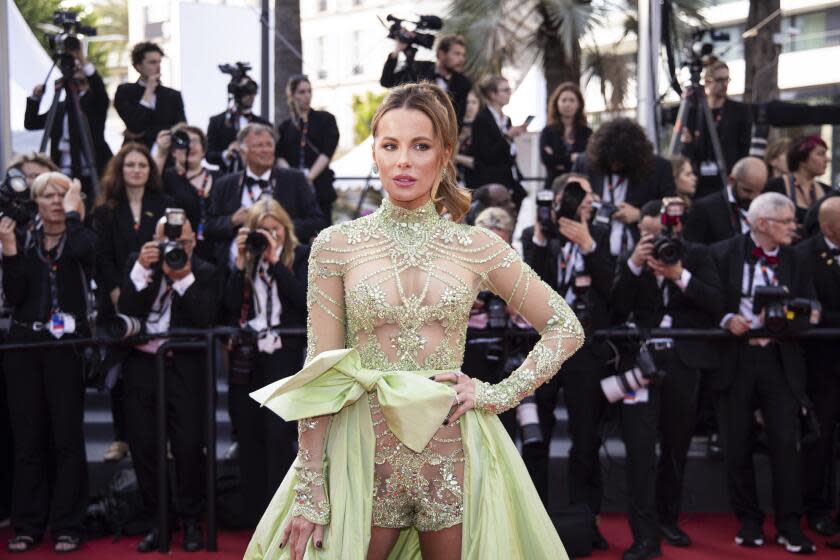Kate Beckinsale mourns death of Roy Battersby, a British TV director and her stepdad

Kate Beckinsale announced this week the death of her stepfather, British television director Roy Battersby.
Battersby died last Wednesday in Los Angeles, surrounded by family after "a brief period of illness," according to a statement shared Monday during Emmys night on Beckinsale's Instagram account. He was 87.
"I have no words yet," the "Underworld" and "Pearl Harbor" actor captioned her post. "I fought for you with everything I had. Oh Roy I am so sorry I lost."
Read more: Kate Beckinsale visits hospital almost immediately after Golden Globes ceremony
Last week, immediately after her Golden Globes appearance, Beckinsale had rushed to the hospital, sharing photos of her gathering with others around a patient's bed, still dressed in her gown. The following day, she posted a black square on her Instagram without a caption. Her Instagram bio read, "A fatherless girl thinks all things are possible, and nothing is safe.” Though Beckinsale did not confirm the death of her stepfather, fans began to send their condolences. Earlier reports from December shared alleged details about Battersby's illness, which included an apparent cancer diagnosis and and stroke.
Battersby joined Beckinsale's family of actors shortly after her father, Richard Beckinsale, known for roles on British sitcoms, suddenly died in 1979 after a heart attack. While dating Beckinsale's mother, Jody Loe, who is also an actor, Battersby moved into their home when Beckinsale was 9, according to a 1997 interview with the Independent. Battersby eventually married Loe in 1997.
"Roy knew I was a traumatised little person," Beckinsale, 50, told the Independent, adding that around the time he moved in, she also struggled with an eating disorder due to her grief. "He didn't expect this idyllic little girl in plaits who'd be nice to him. I wasn't sure whether I wanted my mum to marry anyone else. ... And I certainly didn't want any brothers. Roy had four sons and one daughter. I wasn't in a boy mood. He's been so brilliant. He wasn't pushy, he let me come to him."
Read more: Hugh Hudson, director of Oscar best picture 'Chariots of Fire,' dies at 86
"I couldn't have knitted a better one," she added, referring to Battersby. Yet despite his inviting presence, Battersby also invited some controversy into Beckinsale's household.
Battersby was also an active member of the Workers’ Revolutionary party, a Trotskyist communist group in England. His activities had him blacklisted from the TV industry for a stretch of his career. His 1977 TV documentary, "The Palestinian," drew condemnation for its critical stance on Israel and featured a controversial interview with Palestinian leader Yasser Arafat. The movie also starred Oscar winner Vanessa Redgrave, whose public pro-Palestine beliefs also drew intense backlash throughout her career. During the drama, Beckinsale said, their home was tapped by government authorities.
"Me and my girlfriends would be on the phone talking, you know, 'bum, willy, fanny,' and we’d hear the little click on the phone as the listener came on," she recalled to the Guardian in 2016. "And you can imagine some spook somewhere trying to crack the 'bum-willy-fanny' code!”
Read more: 'Succession,' 'The Bear' and 'Beef' dominate 2023 Emmy Awards
After ending his affiliation with the Workers' party, Battersby's career rebounded, and he directed several episodes of the hit BBC crime drama "Between the Lines" during its three-season run from 1992 to 1994.
Along with Monday's statement, Beckinsale shared a video montage showing photos and video of Battersby with Beckinsale and Loe, laughing and dancing together. The video also included an interview with Battersby, during which he recalled living through World War II in England as a child. At night, during air raids, he remembered hiding inside concrete shelters built on his street of Richmond Avenue in London.
When the war ended, Battersby said, that same street transformed into a festive party, with neighbors setting up tables and chairs on the road and feasting on banana sandwiches, a rare commodity during the war. "It was a wonderful day because it meant the air raids and everything were ending," he recalled, "and people weren't having to leave their families."
This story originally appeared in Los Angeles Times.


